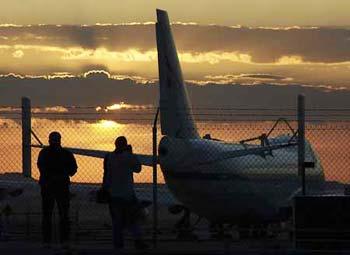NASA: U.S. shuttle Atlantis' landing delayed until Sunday
2009-05-25 10:03 BJT
WASHINGTON, May 23 (Xinhua) -- The landing of U.S. space shuttle Atlantis has been postponed until Sunday because of bad weather, NASA said on Saturday.
 |
| The sun rises over NASA's 747, standing to possibly ferry Space Shuttle Atlantis to Florida, at Edwards Air Force Base in California May 23, 2009. Rainstorms and clouds over Florida forced the space shuttle Atlantis to cancel its attempted homecoming for a second day on Saturday, and NASA said it would try to bring it back to Earth on Sunday.(Xinhua/Reuters Photo) |
"The weather at the Kennedy Space Center (Florida) has not cooperated ... we are waiving for the day," a NASA official said.
NASA has several time options for Sunday's landing either at Kennedy or Edwards Air Force Base in California.
Atlantis' scheduled Friday landing at Kennedy was thwarted by thunderstorms.
The space shuttle lifted off on May 11 on a mission to upgrade the 19-year-old Hubble Space Telescope for the last time. Through five spacewalks, astronauts installed a new camera, a light-splitting spectrograph, replaced Hubble's positioning system, repaired two instruments, and attached a docking ring so that a robotic spacecraft can be sent to remove Hubble from orbit at the end of its operational life.
NASA said Hubble was good for another five to 10 years, unlocking even more mysteries of the cosmos.
Sometime after 2020, NASA will send a robotic craft to steer the telescope into a watery grave.
Hubble, launched by NASA in 1990, was named after U.S. astronomer Edwin Hubble whose work revolutionized our understanding of the size and structure of the universe. After its first two months of tests in 1990, the initial images from Hubble were a blurry disappointment. A slight flaw in the telescope's main mirror -- barely the width of a human hair -- fouled the observatory's vision.
In 1993, NASA sent a shuttle up to Hubble, where astronauts added corrective lenses -- essentially glasses -- to sharpen its vision. The result was crystal clear: 16 years of stunning cosmic photos followed.
Since that first orbital fix, astronauts have returned to Hubble four more times; in 1997, 1999, 2002 and 2009.
Hubble has given the world an amazing insight into the origins of the universe. Among its greatest discoveries were determining the age of the universe (13.7 billion years); finding that virtually all major galaxies have black holes at their centers; discovering that the process of planetary formation was relatively common; detecting the first ever organic molecule in the atmosphere of a planet orbiting another star; and providing evidence that the speed at which the universe is expanding is accelerating -- caused by an unknown force that makes up more than75 percent of the universe.
Editor: Yang Jie | Source: Xinhua
 Mail
Mail Share
Share Print
Print


 Video
Video









 2009 China Central Television. All Rights Reserved
2009 China Central Television. All Rights Reserved